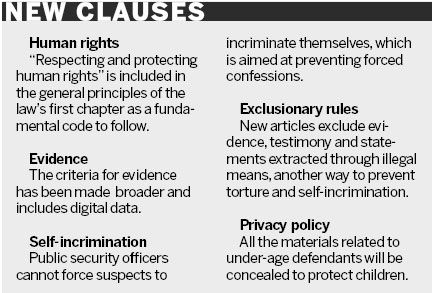Revised criminal law to give suspects greater protection
Updated: 2012-03-12 07:34
By Zhao Yinan (China Daily)
|
|||||||||||
Legislation set to be voted on by the NPC enshrines rights of those held in custody, Zhao Yinan reports in Beijing.
When Zhang Guoxi returned to his office from lunch one Thursday afternoon in July 2010, a team of anti-corruption investigators was already waiting for him.
What followed, according to court documents, was a month of interrogations that eventually resulted in the construction official admitting that he accepted 76,000 yuan ($12,000) in bribes.
When the case went to trial, however, judges deemed the confession inadmissible due to allegations it had been obtained illegally.
It was a landmark decision, and National People's Congress deputies are set to vote on a revised Criminal Procedure Law that is aimed at further protecting the rights of suspects in custody and preventing forced confessions.
Public security bureaus have relied heavily on self-incrimination to solve criminal cases, said Tian Wenchang, director of the All-China Lawyers Association's criminal committee.
|
 |
"These changes (to the law) will, hopefully, reduce the risks during interrogations and improve the investigative tactics used by the police," he said.
A draft of the amended law was released to the public in September and received roughly 80,000 comments, either on e-mail or through the official website of the NPC, the country's top legislative body.
While most people acknowledged the progress being made, the media attention at home and abroad largely focused on several clauses that would have allowed police to detain suspects without informing families for up to six months.
In the version set to go before this year's plenary session of the NPC, almost all the controversial aspects appear to have been omitted.
Wang Zhaoguo, a senior lawmaker, explained to deputies on Monday that the draft now states that public security bureaus must inform a suspect's family within 24 hours of their detention.
The only exceptions, he added, would be when the case is "related to State security or terrorism", or if informing the family would "impede an investigation".
Today's Top News
President Xi confident in recovery from quake
H7N9 update: 104 cases, 21 deaths
Telecom workers restore links
Coal mine blast kills 18 in Jilin
Intl scholarship puts China on the map
More bird flu patients discharged
Gold loses sheen, but still a safe bet
US 'turns blind eye to human rights'
Hot Topics
Lunar probe , China growth forecasts, Emission rules get tougher, China seen through 'colored lens', International board,
Editor's Picks

|

|

|

|

|

|






